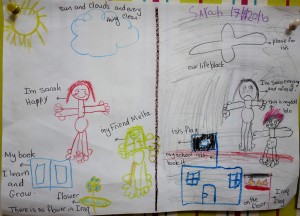I recently returned from visiting multiple countries in the Middle East, where I heard stories from individuals, visited refugee/IDP camps, and met with leaders of various ministries, NGOs, and camps in Northern Iraq. Churches and organizations in Lebanon and Jordan also find themselves overwhelmed with the needs of refugees from Syria and Iraq, but have embraced an incredible opportunity to minister in practical and spiritual ways to those who have experienced severe trauma and deep grief. My perception and perspective to the Middle East has been transformed, especially my limited awareness of believers in that context.
Many Christians in Iraq Aren’t Trying to Leave
During the first days in Northern Iraq, I witnessed a group of Kurds going through advanced training for a trauma healing program, reporting what they had tried to implement and expressing the desire for more insight into addressing painful issues like rape. The acknowledgement of the need for trauma response was never related to finding ways to get out of the country; it was about finding healing there.
A week later we were ready to check out of a hotel in another city, but while standing in the lobby a number of people were arriving for a meeting of Christian leaders. The diversity of apparel spoke volumes of the variety of orthodox and evangelical denominations; the representatives from international organizations were also easy to identify. This serendipitous encounter allowed us to observe leaders of churches that have in the past been at odds, seeking to create a safe community for Christian families (currently planning a pilot project). We heard the needs, the vision, the steps being taken at this very time.
Three days later we visited a tent-village, home to Christians who had been forced out of their homes or left running away from the violence. We met in a larger community tent with a group of families and heard their stories and frustrations. There were practical needs, physical problems, an abundance of uncertainty about what lay ahead. Many had lost loved ones, or weren’t sure if they were even alive. As we prayed together, tears of grief were shed. For many, their faith was key in holding them together. I didn’t hear a desire to leave the country, but the question remained of how they could rebuild their lives or go back to their own towns.
I was not surprised to hear that 90% of Christians have already left Iraq. What I was completely unaware of was the active steps Christian leaders are now taking to create alternatives for the remaining 10%. Although a large portion of the country is still very unsafe, many of those in the north want to rebuild, not further uproot. The hope for finding restoration, for staying closer to family, and for maintaining their community is understandable!
From a spiritual/missional perspective, retaining the 10% is critical! If the remaining Christians left the country, who would be there to share the hope of the gospel to many whose hearts are more open than ever before? There is an abundance of Muslims and Yezidis searching for truth and healing! Now is the time and place for the testimony of Christ’s love and salvation!

Struggles in Syria
Like in Iraq, many Christians have already left Syria. Conversation with a woman currently living there allowed me to better understand the conflict from an in internal perspective. She told us about two sisters who lived on a mountain near a village in Syria. When it was attacked they were forced to flee and left wearing pajamas and taking no possessions. One already had problems with her leg, and lack of care caused it to worsen; now she is reliant on a walker. After six months many villagers returned to their homes, but found them damaged and plundered. The UN and other organizations have provided some practical help, but no one was there to offer comfort.
When a few women and a pastor courageously visited the town over a year later, these women and others had not received any psychological care. It was their first chance to tell their story, to receive care and prayer, and to start build relationships with those offering help. It is these Christians who have a new ministry of reaching out to those who have gone through incredible loss and trauma, partly because it is very difficult for outside NGOs to get into the country. The church is in a strategic, yet tragic, position. The women who told us of her visits to the towns emphasized the need for prayer, noting that it was only through the strength given by God that she could continue her ministry to the persecuted church. She didn’t ask for a way out; she asked for our prayers.
Next Door Neighbors: Reaching the Refugees
Some of the care for those who have fled from their homes is being provided by ministries across the borders in Lebanon and Jordan. Linguistic and cultural similarities help cross barriers, but it is the unconditional love offered, both to Christians and Muslims, that gradually reduces mistrust. “Heart for Lebanon” works to both help refugees in need of food and to encourage ways to regain autonomy, purchasing local food to help the economy and employing refugees.
A church in Jordan has welcomed many who are broken spiritually and emotionally, having experienced a variety of trauma. They also have offered education for children whose lives are being rebuilt and created jobs for refugees previously lacking income. One man had undergone severe torture from ISIS and was suffering severe PTSD, to the point of psychosis, when alone in an apartment after fleeing Syria. When encountering love from believers in Jordan his life was transformed, and he is now working in the Jordanian church, unable to stop sharing his story and God’s love.

These are just two examples of universal efforts being made to live out the command to love your neighbor[ing countries]. These Christians are the ones whose testimony will shout powerfully to all in the Middle East, both Christians and Muslims. Removing them to a more “safe” Western country may be kind in some ways, particularly in good intentions, but they are ones who need help where they live.
Throughout the region of ongoing conflict and current refugees, there is a constant need for our prayers. So many are deeply wounded—physically, emotionally, and spiritually. For them to be equipped to reach out to others, they need to find healing in their own lives.





One Comment